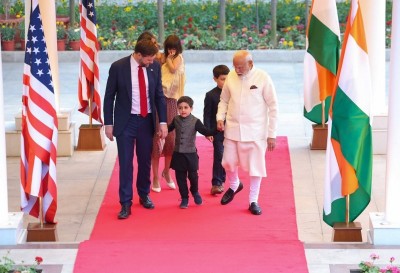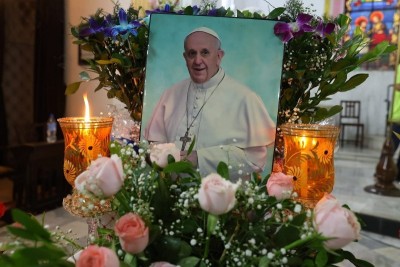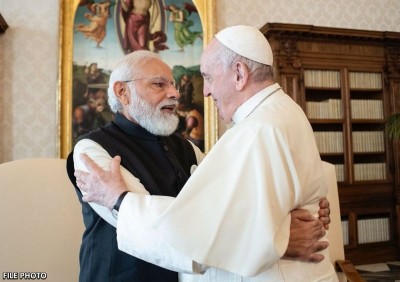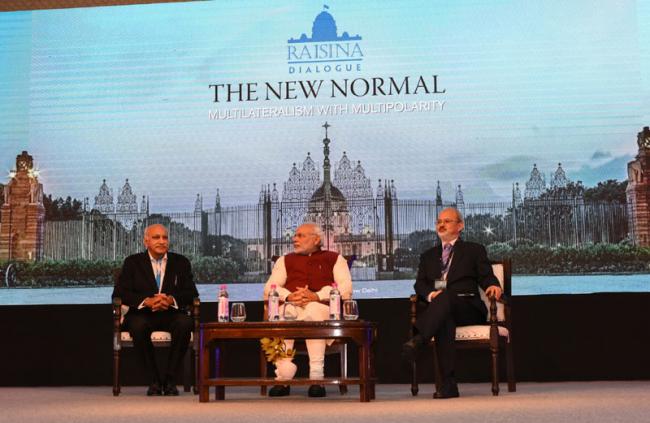
Pakistan should walk away from from terrorism for talks with India: Modi
"My vision for our neighbourhood puts premium on peaceful and harmonious ties with entire South Asia. That vision had led me to invite leaders of all SAARC nations, including Pakistan, for my swearing in. For this vision, I had also travelled to Lahore," Modi said.
"But, India alone cannot walk the path of peace. It also has to be Pakistan's journey to make. Pakistan must walk away from terror if it wants to walk towards dialogue with India," the Prime Minister said while addressing at the opening session of the Second Raisina Dialogue here.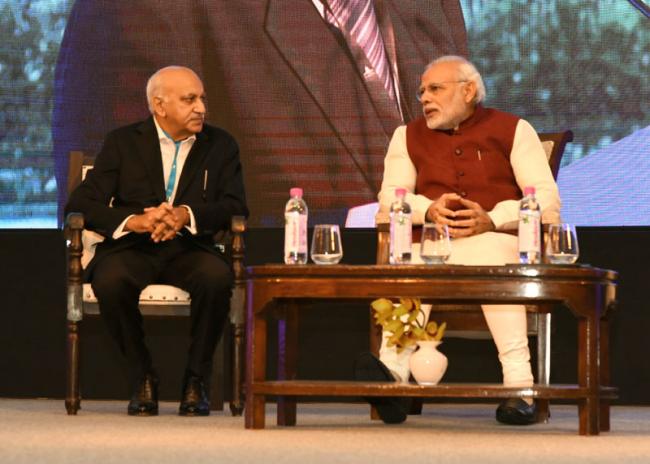
Speaking on India's ties with China, the Prime Minister said: "In our engagement with China, as President Xi and I agreed, we have sought to tap the vast area of commercial and business opportunities in the relationship. I see the development of India and China as an unprecedented opportunity, for our two countries and for the whole world."
"At the same time, it is not unnatural for two large neighbouring powers to have some differences. In the management of our relationship, and for peace and progress in the region, both our countries need to show sensitivity and respect for each other's core concerns and interests," he said.
Full Text of Prime Minister Narendra Modi's speech at the Opening Session of the Second Raisina Dialogue, New Delhi, January 17, 2017:
"Excellencies,
Distinguished guests,
Ladies & Gentlemen,
It is a great privilege to speak to youat the inauguration of the second edition of the Raisina Dialogue. Excellency Karzai Prime Minister Harper, Prime Minister Kevin Rudd, it is a pleasure to see you in Delhi. Also, a warm welcome to all the guests. Over the next couple of days, you would hold numerous conversations on the state of the world around us. You would debate its certainty and prevailing flux; its conflicts and risks; its successes and opportunities; its past behaviours and likely prognosis and its potential black swans and the New Normals.
Friends,
In May 2014, the people of India also ushered in a New Normal. My fellow Indians spoke in one voice to entrust my government with a mandate for change. Change not just of attitudes but of mindsets. Change from a state of drift to one of purposeful actions. Change to take bold decisions. A mandate in which reform would not be enough unless it transforms our economy and society. A transformation that is embedded in the aspiration and optimism of India’s youth, and in the boundless energy of its millions. Every day at work, I draw on this sacred energy. Every day at work, my ‘to do list’ is guided by the constant drive to reform and transform India, for prosperity and security of all Indians.
Friends,
I am aware that India’s transformation is not separated from its external context. Our economic growth; the welfare of our farmers; the employment opportunities for our youth; our access to capital, technology, markets and resources; And, security of our nation all of them are deeply impacted by developments in the world. But, the reverse is also true. The world needs India’s sustained rise, as much as India needs the world. Our desire to change our country has an indivisible link with the external world. It is, therefore, only natural that India’s choices at home and our international priorities form part of a seamless continuum. Firmly anchored in India’s transformational goals.
Friends,
India is pursuing its transformation in unsettled times, which is equally the result of human progress and violent turmoil. For multiple reasons and at multiple levels, the world is going through profound changes. Globally connected societies, digital opportunities, technology shifts, knowledge boom and innovation are leading the march of humanity. But, sluggish growth and economic volatility are also a sobering fact. Physical borders may be less relevant in this age of bits and bytes. But, walls within nations, a sentiment against trade and migration, and rising parochial and protectionist attitudes across the globe are also a stark statistic. The result, globalization gains are at risk and economic gains are no longer easy to come by. Instability, violence, conflict, extremism, exclusion and transnational threats continue to proliferate in dangerous directions. And, non-state actors are significant contributors to the spread of such challenges. Institutions and architectures built for a different world, by a different world, seem outdated. Posing a barrier to effective multilateralism. As the world begins to re-order itself a quarter century after the strategic clarity of the Cold War, the dust has not yet settled on what has replaced it. But, a couple of things are clear. The political and military power is diffused and distributed The multi-polarity of the world, and an increasingly multi-polar Asia, is a dominant fact today. And, we welcome it. Because, it captures the reality of the rise of many nations. It accepts that voices of many, not views of a few should shape the global agenda. Therefore, we need to guard against any instinct or inclination that promotes exclusion, especially in Asia. The focus of this conference on Multilaterism with Multipolarity is therefore timely.
Friends,
We inhabit a strategically complex environment. In the broad sweep of history, the changing world is not necessarily a new situation. The crucial question is how do nations act in a situation where the frames of reference are shifting rapidly. Our choices and actions are based on the strength of our national power.
Our strategic intent is shaped by our civilizational ethos of:
· यथारà¥à¤¥à¤µà¤¾à¤¦ (realism),
· सह-असà¥à¤¤à¤¿à¤¤à¥à¤µ (co-existence)
· सहयोग (cooperation),तथा
· सहà¤à¤¾à¤—िता (partnership).
This finds expression in a clear and responsible articulation of our national interests. The prosperity of Indians, both at home and abroad, and security of our citizens are of paramount importance. But, self interest alone is neither in our culture nor in our behavior. Our actions and aspirations, capacities and human capital, democracy and demography, and strength and success. will continue to be an anchor for all round regional and global progress. Our economic and political rise represents a regional and global opportunity of great significance. It is a force for peace, a factor for stability and an engine for regional and global prosperity.
For my government, this has meant a path of international engagement focused on:
· Rebuilding connectivity, restoring bridges and rejoining India with our immediate and extended geographies.
· Shaping relationships networked with India’s economic priorities.
· Make India a human resource power to be reckoned with, by connecting our talented youth to global needs and opportunities.
· Building development partnerships that extend from the islands of the Indian Ocean and Pacific to the islands of the Caribbean and from the great continent of Africa to the vibrant nations of Americas.
· Creating Indian narratives on global challenges.
· Helping re-configure re-invigorate and rebuild global institutions and organizations.
· Spreading the benefits of India's civilizational legacies, including Yoga and Ayurveda, as a global good. Transformation, therefore, is not just a domestic focus. It encompasses our global agenda.
For me, Sab Ka Saath; Sab Ka Vikas is not just a vision for India. It is a belief for the whole world. And, it manifests itself several layers, multiple themes and different geographies. Let me turn to those that are closest to us in terms of geography and shared interests. We have seen a major shift towards our neighbours captured in our determined "Neighbourhood-first" approach. The people of South Asia are joined by blood, shared history, culture, and aspirations. The optimism of its youth seeks change, opportunities, progress and prosperity. A thriving well-connected and integrated neighbourhood is my dream. In the last two and half years, we have partnered with almost all our neighbours to bring the region together. Where necessary, we have shed the burdens of our past for the progressive future of our region. The result of our efforts is there to see.
In Afghanistan, despite distance and difficulties in transit, our partnership assists in reconstruction, by building institutions and capacities. Amidst shifting politics, our security engagement has deepened. The completion of Afghanistan's Parliament building and the India-Afghanistan Friendship Dam are two shining examples of our dedication to forge developmental partnership. With Bangladesh, we have achieved greater convergence and political understanding, through connectivity and infrastructure projects, and significantly, the settlement of the land and maritime boundaries. In Nepal, Sri Lanka, Bhutan and Maldives, our overall engagement in infrastructure, connectivity, energy and development projects is a source of progress and stability in the region. My vision for our neighbourhood puts premium on peaceful and harmonious ties with entire South Asia. That vision had led me to invite leaders of all SAARC nations, including Pakistan, for my swearing in. For this vision, I had also travelled to Lahore. But, India alone cannot walk the path of peace. It also has to be Pakistan's journey to make. Pakistan must walk away from terror if it wants to walk towards dialogue with India. 
Ladies and Gentlemen,
Further west, we have redefined, in a short span of time, and despite uncertainty and conflict, our partnerships with Gulf and West Asia, including Saudi Arabia, U.A.E, Qatar and Iran. Next week, I will have the pleasure to host His Highness the Crown Prince of Abu Dhabi, who is like a younger brother to me, as the Chief Guest at India’s Republic Day. We have not just focused on altering the angles of perception. We have also changed the reality of our ties. This has helped us protect and promote our security interests, nurture strong economic and energy ties and advance the material and social welfare of around 8 million Indians. In Central Asia too, we have built our ties on the edifice of shared history and culture to unlock new vistas of prosperous partnership. Our membership of the Shanghai Cooperation Organization provides a strong institutional link to our engagement with Central Asian nations. We have invested in all round prosperity of our Central Asian brothers and sisters. And, have brought about a successful reset to longstanding relationships in that region. To our east, our engagement with South East Asia is at the centre of our Act East Policy. We have built a close engagement with the institutional structures in the region such as the East Asia Summit. Our partnership with ASEAN and its member countries has served to enhance commerce, technology, investment, development, and security partnerships with the region. It has also advanced our broad strategic interests and stability in the region. In our engagement with China, as President Xi and I agreed, we have sought to tap the vast area of commercial and business opportunities in the relationship. I see the development of India and China as an unprecedented opportunity, for our two countries and for the whole world. At the same time, it is not unnatural for two large neighbouring powers to have some differences. In the management of our relationship, and for peace and progress in the region, both our countries need to show sensitivity and respect for each other's core concerns and interests.
Friends,
Prevailing wisdom tells us that this century belongs to Asia. The sharpest trajectory of change is happening in Asia. There are large and vibrant pools of progress and prosperity that dot the landscape of this region. But, rising ambition and festering rivalries are generating visible stress points. The steady increase in military power, resources and wealth in the Asia-Pacific has raised the stakes for its security. Therefore, the security architecture in the region must be open, transparent, balanced and inclusive. And, promote dialogue and predictable behavior rooted in international norms and respect for sovereignty.
Friends,
Over the past two and a half years, we have given a strong momentum to our engagement with the United States, Russia, Japan and other major global powers. With them, we not only share a desire to cooperate. We also hold converging views on opportunities and challenges that face us. These partnerships are a good fit with India's economic priorities of capital and capacities, commerce and technology, industry and infrastructure, skills and development, and defence and security. With the United States, our actions have brought speed, substance and strength to the entire spectrum of economic, business, commercial, and security engagement. In my conversation with President-elect Donald Trump, we agreed to keep building on these gains in our strategic partnership. Russia is an abiding friend. President Putin and I have held long conversations on the challenges that confront the world today. Our trusted and strategic partnership, especially in the field of defence has deepened. Our investments in new drivers of our relationship, and the emphasis on energy, trade, and S&T linkages are showing successful results. We also enjoy a truly strategic partnership with Japan whose contours now stretch to all fields of economic activity. Prime Minister Abe and I have spoken of our determination to intensify our cooperation further. With Europe, we have a vision of strong partnership in India’s development, especially in knowledge industry and smart urbanization.
Friends,
India has for decades been at the forefront of sharing our capacities and strengths with fellow developing countries. With our brothers and sisters in Africa, we have further strengthened our ties in the last couple of years. And, built meaningful development partnerships on the solid foundation of decades of traditional friendship and historical ties. Today, the footprint of our development partnership stretches all across globe.
Ladies and Gentlemen,
India has a long history of being a maritime nation. In all directions, our maritime interests are strategic and significant. The arc of influence of Indian Ocean extends well beyond its littoral limits. Our initiative of SAGAR - Security And Growth for All in the Region is not just limited to safe-guarding our mainland and islands. It defines our efforts to deepen economic and security cooperation in our maritime relationships. We know that convergence, cooperation, and collective action will advance economic activity and peace in our maritime region. We also believe, that the primary responsibility for peace, prosperity and security in the Indian Ocean rests with those who live in this region. Ours is not an exclusive approach. And, we aim to bring countries together on the basis of respect for international law. We believe that respecting Freedom of Navigation and adhering to international norms is essential for peace and economic growth in the larger and inter-linked marine geography of the Indo-Pacific.
Friends,
We appreciate the compelling logic of regional connectivity for peace, progress and prosperity. In our choices and through our actions, we have sought to overcome barriers to our outreach to West and Central Asia, and eastwards to Asia-Pacific. Two clear and successful examples of this are the tripartite agreement with Iran and Afghanistan on Chabahar; and our commitment to bring on line the International North South Transport Corridor. However, equally, connectivity in itself cannot override or undermine the sovereignty of other nations. Only by respecting the sovereignty of countries involved, can regional connectivity corridors fulfill their promise and avoid differences and discord.
Friends,
True to our traditions, we have shouldered the international burden of our commitments. We have led assistance and relief efforts in times of disaster. We were a credible first responder during the earthquake in Nepal, evacuation from Yemen and during humanitarian crises in the Maldives and Fiji. We have also not hesitated in shouldering our responsibility for the maintenance of international peace and security. We have increased collaboration on coastal surveillance, white shipping information and fighting non-traditional threats like piracy, smuggling and organized crime. We have also shaped alternative narratives on long standing global challenges. Our strong belief in delinking terrorism from religion, and rejecting artificial distinctions between good and bad terrorism, are now a global talking point. And, those in our neighbourhood who support violence, perpetrate hatred, and export terror stand isolated and ignored. On the other pressing challenge of global warming, we have moved into a leading role. We have an ambitious agenda and an equally aggressive target to generate 175 giga watts from renewable energy. Out of this, 50 Giga Watts has already been achieved. We have shared our civilizational traditions to promote harmonious living with nature. We also brought the international community together to create an International Solar Alliance, to harness the energy of sun to propel human growth. A high point of our efforts has been the revival of international interest in the cultural and spiritual products of India’s civilizational stream. Today, Buddhism, yoga and Ayurveda are recognized as invaluable heritage of humanity as a whole. India will celebrate this common heritage every step of the way. As it builds bridges across countries and regions and promotes overall well-being.
Ladies & gentlemen,
Let me say this in conclusion, In connecting with the world, our ancient scriptures have guided us.
Rig Veda says, आ नो à¤à¤¦à¥à¤°à¥‹ : कà¥à¤°à¤¤à¥à¤µà¥‹ यनà¥à¤¤à¥ विशà¥à¤µà¤¤à¤ƒ Means: "Let noble thoughts come to me from all directions”.
As a society, we have always favoured needs of many over the want of one. And, preferred partnerships over polarization. We hold the belief that success of one must propel the growth of many. Our task is cut out. And, our vision is clear. The journey of national rejuvenation begins at home. And, is strongly supported through our constructive and collaborative partnerships that span the globe. With resolute steps at home, and expanding network of reliable friendships abroad, we will grasp the promise of a future that belongs to over a billion Indians. And in this endeavor, you will find in India, my friends, a beacon of peace and progress, stability and success, and access and accommodation.
Thank you.
Thank you very much."
Support Our Journalism
We cannot do without you.. your contribution supports unbiased journalism
IBNS is not driven by any ism- not wokeism, not racism, not skewed secularism, not hyper right-wing or left liberal ideals, nor by any hardline religious beliefs or hyper nationalism. We want to serve you good old objective news, as they are. We do not judge or preach. We let people decide for themselves. We only try to present factual and well-sourced news.





